The common-law distinction between felonies and misdemeanors has no application to military offenses.
While the finding of a court of inquiry acquitting the prisoner of all blame is not a legal bar to a prosecution, it is entitled to weight as an expression of the views of the military court of the necessity of using a musket to prevent the escape of the deceased.
* * * * *
By order of the Secretary of War:
R.
C. DRUM, AdjutantGeneral._
The following is taken from Circular No. 3, of 1883,
from
Headquarters Department of the Columbia:
VANCOUVER BARRACKS, W. T., April20,_1883_.
To the ASSISTANT ADJUTANT GENERAL,
Departmentof_the_Columbia._
SIR:
* * * * *
A sentinel is placed as guard over prisoners to prevent their escape, and, for this purpose, he is furnished a musket, with ammunition. To prevent escape is his first and most important duty.
* * * * *
I suppose the law to be this: That a sentinel shall not use more force or violence to prevent the escape of a prisoner than is necessary to effect that object, but if the prisoner, after being ordered to halt, continues his flight the sentinel may maim or even kill him, and it is his duty to do so.
A sentinel who allows a prisoner to escape without firing upon him, and firing to hit him, is, in my judgment, guilty of a most serious military offense, for which he should and would be severely punished by a general court-martial.
* * * * *
(Signed) HENRY
A. MORROW,
ColonelTwenty-first_Infantry,_Commanding_Post._
p>
[Third indorsement.]
OFFICE
JUDGE ADVOCATE,
MILITARY DIVISION OF
THE PACIFIC,
May11,_1883._
Respectfully returned to the assistant adjutant general, Military Division of the Pacific, concurring fully in the views expressed by Col. Morrow. I was not aware that such a view had ever been questioned. That the period is a time of peace does not affect the authority and duty of the sentinel or guard to fire upon the escaping prisoner, if this escape can not otherwise be prevented. He should, of course, attempt to stop the prisoner before firing by ordering him to halt, and will properly warn him by the words “Halt, or I fire,” or words to such effect.
W. WINTHROP, JudgeAdvocate_.
[Fourth indorsement.]
HEADQUARTERS MILITARY
DIVISION OF THE PACIFIC,
May11,_1883._
Respectfully returned to the commanding general, Department of the Columbia, approving the opinion of the commanding officer, Twenty-first Infantry, and of the judge advocate of the division, in respect to the duty of and method to be adopted by sentinels in preventing prisoners from escaping.




